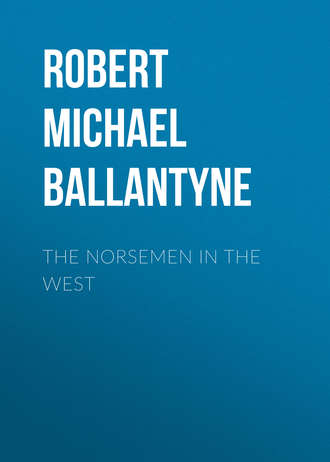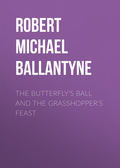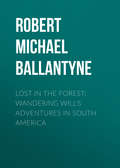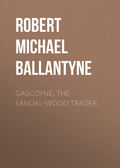
Robert Michael Ballantyne
The Norsemen in the West
“When I see him do it I will believe it,” replied Thorward doggedly.
“You will not, I suppose, object to follow, if I lead the way?” asked Hake.
“Go to, thrall! Dost think I am afraid?” said Thorward sternly; and then, as if he thought such talk trifling, turned on his heel with a light laugh, and was about to descend the bank of the river to the spot where the men stood in a group near the canoes, when Karlsefin called him back.
“Softly, not so fast, Thorward. Although no doubt we are valiant sailors—and woe betide the infatuated man who shall venture to deny it!—yet must we put our pride in our pouches for once, and accept instruction from Hake. After all, it is said that wise men may learn something from babes—if so, why may not sea-kings learn from thralls?—unless, indeed, we be not up to the mark of wise men.”
“I am all attention,” said Thorward.
“This, then,” said Hake, pointing to a large rock in the middle of the stream, “is the course you must pursue, if ye would reach the upper end of the rapid in a dry skin. See you yonder rock—the largest—where the foam breaks most fiercely, as if in wrath because it cannot overleap it? Well, that is our first resting-place. If you follow my finger closely, you will see, near the foot of the rapid, two smaller rocks, one below the other; they only show now and then as the surges rise and fall, but each has an eddy, or a tail of smooth water below it. Do you see them?”
“I see, I see,” cried Thorward, becoming interested in spite of himself; “but, truly, if thou callest that part of the river smooth and a ‘tail,’ I hope I may never fall into the clutches of the smooth animal to which that tail belongs.”
“It is smooth compared with the rest,” continued Hake, “and has a back-draught which will enable us to rest there a moment. You will observe that the stone above has also a tail, the end of which comes quite down to the head of the tail below. Well, then, you must make such a bold dash at the rapid that you shall reach the lower eddy. That gained, the men will rest a space and breathe, but not cease paddling altogether, else will you be carried down again. Then make a dash into the stream and paddle might and main till you reach the eddy above. You will thus have advanced about thirty yards, and be in a position to make a dash for the long eddy that extends from the big rock.”
“That is all very plain,” observed Thorward; “but does it not seem to you, Hake, that the best way to explain matters would be to go and ascend while we look on and learn a lesson through our eyes?”
“I am ready,” was the youth’s brief reply; for he was a little hurt by the seaman’s tone and manner.
“Thorward is right, Hake,” said Karlsefin. “Go, take your own canoe up. We will watch you from this spot, and follow if all goes well.”
The young Scot at once sprang down the bank, and in a few minutes his canoe with its six men, and Heika steering, shot out from the bank towards the rapid.
All tendency to jest forsook Thorward as he stood beside his friend on the cliff with compressed lips and frowning brow, gazing upon the cork-like vessel which danced upon the troubled waters. In a minute it was at the foot of the broken water. Then Heika’s voice rose above the roar of the stream, as he gave a shout and urged on his men. The canoe sprang into the boiling flood. It appeared to remain stationary, while the men struggled might and main.
“’Tis too strong for them!” cried Thorward, becoming excited.
“No; they advance!” said Karlsefin in a deep, earnest tone.
This was true, but their progress was very small. Gradually they overcame the power of the stream and shot into the first eddy, amid the cheers of their comrades on shore. Here they waited only a moment or two, and then made a dash for the second eddy. There was a shout of disappointment from the men, because they swept down so fast that it seemed as if all the distance gained had been lost; but suddenly the canoe was caught by the extreme tail of the eddy, the downward motion of its bow was stopped, it was turned straight upstream, and they paddled easily towards the second rock. Another brief pause was made here, and then a dash was made for the eddy below the large rock. This was more easily gained, but the turbulence of the water was so great that there was much more danger in crossing from one eddy to the other than there had been before.
Under the large rock they rested for a few minutes, and then, dashing out into the rapid, renewed the struggle. Thus, yard by yard, taking advantage of every available rock and eddy, they surmounted the difficulty and landed at the head of the rapids, where they waved their caps to their friends below.
“It’s Krake that wishes he was there!” observed that worthy, wiping the perspiration from his brow and drawing a long deep breath; for the mere sight of the struggle had excited him almost as much as if he had engaged in it.
“’Tis Krake that will soon be there if all goes well,” remarked Karlsefin, with a laugh, as he came forward and ordered his canoe to be pushed off. “I will be ready to follow, but you had better go first, Thorward. If anything befalls you I am here to aid.”
“Well, come along, lads,” cried Thorward. “Get into the bow, Tyrker, and see that you do your duty like a man. Much depends on you—more’s the pity!” He added the last words in a low voice, for Thorward, being a very self-reliant man, would like to have performed all the duties himself, had that been possible.
“Shove off!”
They shot from the bank and made for the rapid gallantly. Thorward’s shout quite eclipsed that of Heika on taking the rapid. Truly, if strength of lung could have done it, he might have taken his canoe up single-handed, for he roared like a bull of Bashan when Tyrker missed a stroke of his paddle, thereby letting the bow sweep round so that the canoe was carried back to the point whence it had started.
Tremendous was the roar uttered by Thorward when they faced the rapid the second time, and fierce was the struggle of the men when in it, and anxious was Tyrker to redeem his error—so anxious, in fact, that he missed another stroke and well-nigh fell overboard!
It is said that “Fortune favours the brave.” There was no lack of bravery in Tyrker—only lack of experience and coolness—and Fortune favoured him on this occasion. If he had not missed a stroke and fallen forward, his miscalculation of aqueous forces would have sent the canoe past the mark in the opposite direction from the last time; but the missed stroke was the best stroke of all, for it allowed the canoe to shoot into the first eddy, and converted a terrific roar of wrath from Thorward into a hearty cheer.
Resting a few moments, as Heika and his crew had done, they then addressed themselves to the second part of the rapid. Here Thorward steered so well that the canoe took the stream at the proper angle; but Tyrker, never having perceived what the right angle was, and strongly impressed with the belief that the bow was pointing too much up the river, made a sudden stroke on the wrong side! The canoe instantly flew not only to the tail of the eddy, but right across it into the wild surges beyond, where it was all but upset, first to one side then to the other, after which it spun round like a teetotum, and was carried with fearful violence towards one of those rocky ridges which we have described as being alternately covered and uncovered by the foam. On the crest of a bulging cascade they were fortunately borne right over this ridge, which next moment showed its black teeth, as if grinning at the dire mischief it might have done if it had only chosen to bite! Next instant the canoe overturned, and left the men to flounder to land, while it went careering down towards the gravelly shallows below.
Now Karlsefin had anticipated this, and was prepared for it. In the first place, he had caused the arms, etcetera, to be removed from Thorward’s canoe before it set out, saying that he would carry them up in his canoe, so that his friend’s might go light. Then, having his vessel ready and manned, he at once pushed out and intercepted the other canoe before it reached the gravelly shallows, where it would have been much damaged, if not dashed to pieces.
“That is bad luck,” observed Thorward, somewhat sulkily, as, after swimming ashore, he wrung the water from his garments.
“Not worse than might have been expected on a first trial,” said Karlsefin, laughing. “Besides, that rascal Tyrker deceived me. Had I known he was so bad, you should have had Krake.”
Poor Tyrker, very much crestfallen, kept carefully away from the party, and did not hear that remark.
“Now it is my turn,” continued Karlsefin. “If we get up safely I will send Heika down to take the bow of your canoe.”
Karlsefin, as we said, was somewhat more expert than most of the men in managing canoes, and Krake, besides having had more experience than many of his fellows, had once before visited and ascended this rapid. They therefore made the ascent almost as well as the Scots had done.
Arrived at the upper end, Hake and Heika were ordered to remove everything out of their canoe, and, with a full crew, to run down to the aid of their friends. Karlsefin himself went with them as one of the crew, so that he might take the steering paddle when Heika should resign it in order to act as Thorward’s bowman. Thus manned, the second attempt was crowned with success, and, not long afterwards the three canoes swept into a smooth reach of the river above the rapids, and proceeded on their way.
But a great deal of time had been lost in this way, and Karlsefin felt that it must be made up for by renewed diligence and protracted labour.
Chapter Twenty.
Remarkable Experiences of Olaf and Snorro—The Former Suffers the Pangs of Remorse
A camp of savages is, in some respects, exceedingly unattractive. Indeed, it may truly be said to be in many respects repulsive. There are usually odours in such a camp which are repellent to the nose, dishes that are disgusting to the taste, sights that are disagreeable to the eyes, sounds that are abhorrent to the ear, and habits that are uncongenial to the feelings.
Nevertheless there is much in such a camp that is deeply interesting. The student of nature, the mental and moral philosopher, the anthropologist, and the philanthropist—ay, even the cynic—might each find much food here suited to his particular tastes and powers of mental digestion. At present, however, we have chiefly to do, good reader, with that which interests you and me—namely, Olaf and Snorro, who were prisoners of war in a savage camp.
The camp referred to was not the small affair already described as having taken sudden flight from the rivulet which flowed into the great river, where we have left the Norsemen doing battle with the waters. It was the great parent, of which that little camp was but an offshoot—the head-quarters of a whole tribe of savages, who dwelt in it to the extent of many hundreds. Yet it was not a fixed camp. It was a moving village of leathern tents, or wigwams, pitched without any regard to order, on the margin of what appeared to be a small lake, but which was in reality a mere widening of the great river.
Hither Olaf and Snorro were brought by their captors, and immediately conveyed to the tent of the chief, who was an aged and white-haired though vigorous and strong-boned savage. Whitepow, for such, curiously enough, was his name, opened his eyes uncommonly wide when he saw the children of the Norsemen, and, sitting up on the couch of furs on which he had been reclining, gazed at them for about five minutes without speaking, almost without winking.
Snorro did not appear to relish this, for he crept close to Olaf’s side and tried to turn away his eyes, but found this to be impossible, for a sort of fascination kept them riveted on the countenance of the aged Whitepow.
At last the savage chief opened his mouth as well as his eyes, and spoke to the savage who had brought the children into the royal presence. That worthy rapidly related the circumstances of the capture—at least so it is to be presumed, but no one can now tell for certain—after which Whitepow turned to Olaf and said something which as near as possible resembled the words:
“Whardeekum froyoul ittlsiner?”
“I don’t understand you,” answered Olaf humbly. Whitepow repeated the words, and Olaf reiterated his assurance that he could make nothing of them whatever.
This concluded the interview at that time, and Whitepow gave an order which resulted in the children being conveyed to a tent where there were several women, old and young, to whom they were handed over with a message which we cannot record, not knowing what it was.
The reception which they met with from these native women was flattering, if not in all respects pleasant. First, they were placed in the centre of the group and gazed at in wondering admiration. Then they were seized and kissed and hugged all round the circle. Then they were examined carefully all over, and under as well, their white skins being as much a matter of interest as their clothing. After that their fair hair was smoothed and parted by not untender hands, and they were hugged again—just as two new dolls might have been by a group of sisters on first making their acquaintance.
Of course there was an immense deal of talking and chatting and commenting, also no small amount of giggling, and once or twice one of the women addressed Olaf; but Olaf shook his head and stuck to his first assurance that their words were incomprehensible.
All this was borne by the captives with wonderful equanimity, because neither was old enough to be much affected by dirtiness of person or garments, and both were thoroughly able to appreciate kindness.
Finally, a stout and not bad-looking young woman took possession of Snorro, and robbed her own offspring in order to bestow on him a very acceptable drink of milk. This last act quite reconciled him to his fate, and Olaf, though not so easily won over, was somewhat mollified by a kindly old woman, who placed him at her side, and set before him a dish of dried berries.
When this feeding process was concluded, and the first blush of novelty began to wear off, the children were turned out in front of the women’s tent, where, seated together on a bit of wood, they underwent the inspection of the whole tribe, old and young, male and female. This was a much more trying ordeal, but in about an hour an order was issued which resulted in the dispersion of every one save a few boys, who were either privileged individuals or rebellious subjects, for they not only came back to gaze at the children, but ventured at length to carry them off to play near the banks of the river.
Olaf was so far reconciled to his new friends that he did not object to witness and take an interest in their games, though he resolutely refused to join, fearing that if he did so his little charge might be spirited away while he was not watching.
At last one of the boys, whose head was very small and round, and whose name appeared to be Powlet, came forward with a little red paint, and offered to apply it to Olaf’s face. All the boys’ faces were, we may observe, more or less painted with black, red, white, and blue colours, and their heads were decorated more or less with feathers. Indeed, these feathers constituted, with the exception of a trifling shred of leather about the loins, and some feathers in their hair, all the clothing they wore at that season of the year.
Olaf refused to be painted, whereupon Powlet rubbed the red paint on the point of his own nose, an operation which so tickled the fancy of Snorro, that he burst into a hearty fit of laughter, to Olaf’s ineffable joy.
“That’s right, Snorrie,” he cried, setting the child on his knee, “laugh again; do it heartily; it will cheer us both.”
“It am so fun-ny, O’af,” said Snorro, repeating the laugh as he looked at the native boy.
Observing the success of his efforts to please, Powlet put a spot of the red paint under each eye, and Snorro laughed so much at this that all the other boys came crowding round to ascertain and enjoy the joke.
Powlet now offered to anoint Snorro in the same way, but Snorro objected, and, pointing to his protector said, with a look of glee—
“Do O’af.”
Nothing else would have induced Olaf to submit, but Snorro’s wish was law to him. He therefore consented at once, and Powlet, dipping his finger in the red paint which he carried in the hollow of his hand, drew a thick stroke from Olaf’s forehead down to the point of his nose, where he made it terminate in a large, round spot.
There was a tremendous shout at this, not only from Snorro, but from all the other boys; and Olaf was so pleased to see Snorro happy, that he turned to Powlet, pointed to his face, and nodded his head by way of inviting further decoration.
Powlet was an intelligent boy. He understood him at once, and went on with his work, a boy coming up at the moment with some white paint in his hand, and another with some blue. A white diamond was immediately planted on each cheek, and a blue circle under each eye, with a red spot in the centre of each. So far, the work was very striking and suggestive, but when Powlet finished off by drawing a series of blue, red, and white lines over Olaf’s eyes, in the forms that usually indicate astonishment, added a red oval to the chin, with a blue spot in the middle of it, and stuck some feathers in his hair, the effect was absolutely tremendous, for it caused the native boys to yell with delight, and Snorro almost to fall off his protector’s knee in a fit of juvenile hysterics.
“Don’t overdo it, Snorrie,” said Olaf in some alarm.
“Oh! O’af, ’oo is so fun-ny!” he cried again, giving way to mirth till the tears ran down his cheeks.
At this point a tall savage came rushing out of the chief’s tent with glaring eyes, and made for the spot where the boys were assembled. They seemed to know at once what was his errand, for, with one consent, they scattered and fled. The tall savage singled out Powlet, caught him, punched his head, and flung him into the river, after which he turned, and, without taking any notice of the captives further than to gaze at them, returned leisurely to the regal tent.
Meanwhile Powlet came to the surface, swam like an otter to the shore, and, clambering up the bank, ran into the woods, seemingly none the worse of his bath.
Thus left alone, Olaf put Snorro on his back and sauntered away into the woods along the banks of the river. Forgetting his ridiculous appearance, he began to think of home and to feel very sad, while his charge, overcome with his late exertions, fell asleep on his back. The longer he walked the sadder he grew, and at last he groaned rather than said, “What shall I do?”
Suddenly it occurred to him, that as the savages appeared to be very careless about watching him, he might run away. It could do no harm to try, and he would not be in a much worse position than when lost in the woods before. Under the influence of this thought he stopped and looked cautiously round in all directions. No one was to be seen. He breathed hard, turned off the track on tiptoe until he had got into what appeared to him to be a very dense and sequestered part of the woods, then suddenly took to his heels and ran for his life!
A loud laugh sounded in the bushes in front of him, and he stopped short just as Powlet appeared, wagging his small head and laughing inordinately.
Poor Olaf guessed at once that the boy had been set to watch him; he therefore wheeled about and walked back to the river, where, going out on a spit of land that he might not be overheard, he sat down on the ground and communed bitterly with himself.
“Oh why, why did I break my promise?” he murmured in deep despondency.
After a long silence he began to think aloud.
“It all comes of disobedience!” he muttered.
“Father used to say, ‘If you love me, obey me. If you want to prove that you love Gudrid, obey her.’ That’s it, Olaf. It’s there that the sin lies. He told me never to pass the ridge, and I did pass the ridge, even though I had promised not to; and so, owing to that little bit of disobedience, here you are, Olaf—and Snorrie too—poor Snorrie—and we’re likely to remain here for ever, as far as I can see. Oh that I had not done it! But what good can wishing do now? If I had loved father better, perhaps I would have obeyed him better.”
It would almost seem as if Olaf had heard of such a word as this— “If ye love me, keep my commandments!”
After a few minutes he broke forth again— “Yes, I know that I did not intend to disobey; nevertheless I did it. And I did not think such awful things would follow—but that does not mend the matter. What shall I do? Snorrie, I think I could gladly lay down my life, if I could give you back once more to your mother.”
Snorro heard not the remark. He was as sound as a top, and Olaf looked sadly at the little head that lay on his shoulder. Then it struck him that it was high time to have the child put to bed, so he rose and hurried back to the women’s tent, where he was received with as much kindness as before.
Very soon Snorro’s little head reposed upon a pillow of rabbit-skins, and not long after that Olaf went to rest beside him on a deer-skin couch, where, lying on his back, he could see the sky through the hole in the top of the tent whence the smoke of the fire escaped. As he lay there the burden of his thoughts was ever the same— “Oh why did I do it? Why did I disobey?” Thus the poor boy lay, self-condemned, and gazed upwards and pondered, until sweet sleep came and carried heart and brain to the blessed refuge of oblivion.







